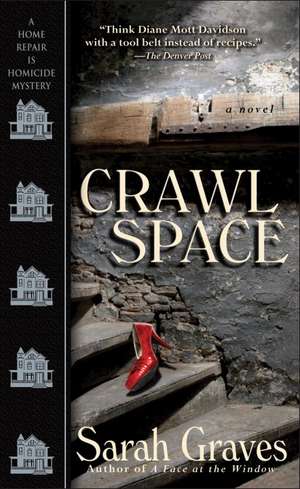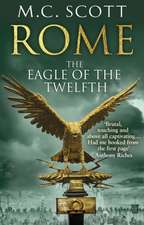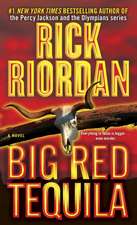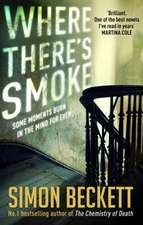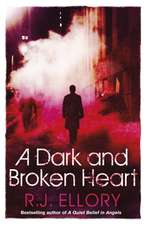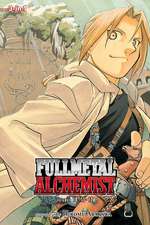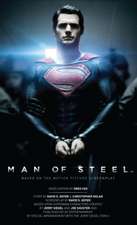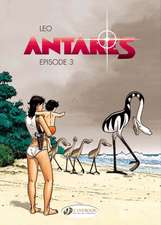Crawlspace: Home Repair Is Homicide Mysteries (Paperback)
Autor Sarah Gravesen Limba Engleză Paperback – 31 mar 2011
Preț: 45.95 lei
Nou
Puncte Express: 69
Preț estimativ în valută:
8.80€ • 9.56$ • 7.39£
8.80€ • 9.56$ • 7.39£
Carte disponibilă
Livrare economică 31 martie-14 aprilie
Preluare comenzi: 021 569.72.76
Specificații
ISBN-13: 9780553591132
ISBN-10: 0553591134
Pagini: 358
Dimensiuni: 102 x 184 x 26 mm
Greutate: 0.18 kg
Editura: Bantam
Seria Home Repair Is Homicide Mysteries (Paperback)
ISBN-10: 0553591134
Pagini: 358
Dimensiuni: 102 x 184 x 26 mm
Greutate: 0.18 kg
Editura: Bantam
Seria Home Repair Is Homicide Mysteries (Paperback)
Notă biografică
Sarah Graves lives with her husband in an 1823 Federal-style house in Eastport, Maine, where her mystery novels are set. When she is not scraping, painting, glazing, sanding, hammering, or otherwise repairing (or failing to repair!) the old house, she is working on her next Home Repair Is Homicide novel, Knockdown.
Extras
Chapter One
You're awfully quiet," Carolyn Rathbone complained as Chip Hahn pulled the Volvo sedan into the empty parking lot and turned the ignition off at last.
He looked down at his hands. He'd had a bad feeling about this trip all along. Still did.
She tried again: "Don't you like these people you're going to see tomorrow, or what?"
It was just past eight in the evening. He'd been driving all day to reach Eastport, Maine, before nightfall and had missed by about four hours. God, it got dark early here in November.
"I like them. It's been ten years since I've seen them, is all." More than ten, actually, so long ago that he hadn't even called to let any of them know he was coming.
He just meant to stop in and say hello if they were at home. And anyway, his silence had nothing to do with his old friends, but Carolyn had stopped listening and got out of the car before he could finish saying so.
Sighing, he hauled the heavy satchel containing her laptop, BlackBerry, iPod, and vodka bottle plus six hardcover copies of her latest book, Young Savages: Bad Drugs, Sick Sex, and Bloody Murder in the Richest Town in America, out of the Volvo's back seat. The parking lot overlooked a wooden pier sticking out into Passamaquoddy Bay, he knew from his map. The long, narrow body of salt water divided Moose Island, which the little bayside town of Eastport perched on, from the Canadian island of Campobello.
Tonight the bay was inky black, with thin, silvery crescents shining atop the waves, reflections of dock lights illuminating a long concrete breakwater about a hundred yards distant. The salt air smelled of seaweed, creosote, and wood smoke.
"Come on, Chip," Carolyn called petulantly from across the street. "Hurry up."
The cold wind off the water cut through his jacket, adding another complaint to his already full list of them. He was tired, hungry, and unaccountably nervous, and the sharp tang of sea salt in the night air somehow made him feel worse.
As he shouldered Carolyn's satchel another unpleasant shiver went through him, as if he not only wanted to be home in his own small, familiar Manhattan apartment, but that he should be. That something bad might happen because he wasn't.
And so far, nothing about Eastport was doing much to change that. Old two-story brick commercial buildings lined the main street. All were dark now except the one open restaurant on the corner, a half-dozen cars clustered in front of it.
Other than that, this end of the street was dead. A few of the storefronts had plywood sheets nailed over their windows. Kids hung out near the benches at the far end of the parking lot, laughing and cursing, showing off for one another.
A police car cruised past, slowing to give the kids a long looking over. Other than that, hardly anyone was around.
Well, but it was nearly winter, Chip reminded himself. Any tourists this remote, thinly settled coastal area got in summer had gone home weeks ago. He felt another pang of homesickness for the city, where sirens and garbage trucks and the low, constant thrum of human activity at least reassured him that someone was alive 24/7.
"Come on, Chipper," Carolyn whined from in front of the restaurant. With the satchel digging what felt like a trench into his neck, he hurried to catch up with her, looking both ways unnecessarily before he crossed the street.
"So, does this place meet with Madame's approval?" he asked her when he reached the other side.
He'd have been happy to get a sandwich and fries at a burger joint on the mainland. But Carolyn had vetoed those, supposedly on the grounds that she wanted to eat authentic Maine seafood.
Why that could be gotten only on an island she didn't bother explaining, and anyway he wouldn't have believed it. He knew the real reason was that none of the places they had passed served drinks, and because they were way out here in the boonies, she was saving the rest of the vodka in the satchel for later.
"Listen, about tomorrow . . ." he began hesitantly. He'd been thinking all day about how to tell her. Might as well get it over with. But she brushed him away with an impatient flutter of red-tipped fingers, while diners inside the restaurant's large plate-glass windows observed her with interest.
No surprise there; in her late twenties, Carolyn was still girlishly striking, with long, glossy black hair, enormous blue eyes, and expert makeup he knew she'd paid a mint to learn to apply. Tonight she wore skinny black jeans with a white silk shirt, heeled leather boots, and a black leather jacket that made her tiny frame look even slimmer than it was.
But then, Carolyn's outfits always looked good, too, even after a long drive or a hellish transcontinental flight or a mob-scene book signing, because no matter the difficulty of the task, she always made sure someone else did the heavy lifting.
A beat-up old Ford pickup went by with a low rumble of bad muffler, one fender hanging on by a glob of Bondo and the other heavily patched with duct tape. All Chip could hear of the music coming from the truck was the bass line: boomp, boomp, boomp. When the kid behind the wheel spotted Carolyn, his jaw dropped and the truck slowed suddenly, as if the mere sight of her had taken the strength from the driver's body.
Chip rolled his eyes. Makeup lessons or not, he personally thought that her eyeliner was way too heavy, and that the blood-colored lipstick Carolyn wore made her mouth resemble a wound.
"Oh, tomorrow," she mimicked him, ignoring the kid who now revved his truck's engine show-offily and had to rescue it from a stall before roaring away.
"We've been through that already, Chip, okay?" Carolyn said. "Spend all day with these friends of yours if you want to, but I have other plans. I mean, I didn't come this far just to chicken out at the last minute."
"Fine. Whatever you say." It wasn't what he'd wanted to talk about. But when she got like this, there was no point arguing with her. He held the restaurant door for her, then abruptly forgot his troubles at the aromas greeting him inside.
Grilled vegetables, garlicky shrimp in some kind of wine sauce, and a heap of rice pilaf went by on a platter. He felt as if all the delicious smells were seizing him by the nose, floating him through the air like a cartoon character.
A hostess swiftly seated them at a table near the window, brought glasses of wine, and recommended a combination plate containing samples of the day's specials. A short time later--Carolyn hadn't even finished her wine before the food began arriving, a first for her, in Chip's experience--ecstasy ensued.
Smoked-salmon pizza slid down like ambrosia, the lobster in spinach sauce tasted like heaven, and the duck with a conserve of ginger and passion fruit . . . absolute bliss. After half an hour Chip sighed, relaxing into the pleasure of a decent meal after a long day's drive, then looked up to find Carolyn eyeing him sourly.
The spinach sauce curdled on his tongue. "What?"
She'd ordered a whisky neat and was sipping from it, never a good sign. "I should be asking you."
Her blue eyes regarded him coldly across the table. He wondered if her legions of devoted fans ever noticed that they looked like ice chips, shaped and polished to resemble human eyes.
She sipped more single malt. "Because I got an e-mail today. A very puzzling e-mail. From Siobhan Walters. About you."
Oh, hell. He felt the comfort of the good food slide away. Siobhan--pronounced Sha-vaun but spelled the old Irish way--was Carolyn's New York editor.
He'd felt he could trust Siobhan. He'd believed he could confide in her, without everything he said to her getting back immediately to Carolyn.
He'd thought that Siobhan could just possibly manage to keep her mouth shut. Wrong.
He swallowed some wine, felt it go down badly and barely saved himself from a coughing fit.
"And Siobhan says"--another harmless-looking sip of the single malt, the way gasoline was harmless when you trickled it onto a fire--"Siobhan says you've got ambitions."
She gave the word a knowing twist that told him the jig was up, so under her ice-chip gaze he decided to come clean.
"Look, Carolyn, don't take it the wrong way. You had to know that being your assistant wouldn't be a permanent career for me. I mean, don't get me wrong," he added. "It's been great."
He could practically feel his nose growing. He hadn't told Carolyn about his foray into online music criticism, either. But that was minor compared to this.
"But I do have a book of my own in mind, and I did talk to Siobhan not long ago, just in an exploratory way--"
Carolyn laughed, a cawing sound of derision that drew looks from people at other tables nearby. She drank off the remaining whisky.
"Hey, it's not that I blame you for trying to slide in on my coattails," she said. "And Siobhan doesn't, either."
Outside the big window, the junky pickup truck went by again. The kid behind the wheel looked happy, like he didn't want any more than he already had.
Or if he did, he wasn't worrying about it; Chip wondered enviously what it felt like not to be always desperately trying to achieve something while at the same time being afraid you couldn't.
"So I'm not very pissed off," continued Carolyn. "I mean, I do get it. You want something all for yourself, and it's perfectly understandable that you would try for a shortcut."
He looked down at his plate, where a smear of passion fruit sauce stained the edge of a remaining bit of pizza crust. He had not been trying to take a shortcut.
"You called Siobhan?" he asked. But of course she had. At one of the rest areas on their way here, probably, on her cell phone.
Miserably, he imagined how the talk between her and Siobhan must've proceeded, their pitying laughter. His own call to the eminent editor now appeared to him for what it was: a pathetic try at raising himself above his station.
He put his napkin on the table. "I'm sorry if I embarrassed you." There was wine still in his glass, but he didn't want it.
"You embarrassed yourself, that's all. Think of it as a learning experience."
Right, he thought bitterly--learning his place, which was that of a paid servant. He hadn't always been one, he reminded himself. But he'd bought that trip when he'd started working for Carolyn, and now he was on it. So if he was unhappy, he supposed he had no one to blame but himself.
A naturally gifted researcher, he'd discovered fifteen years earlier how easy it was to go online, learn all about nearly any subject, then sell the info nuggets he had mined to his less adept classmates for their essays and term papers.
Later on, he'd found his talent for writing things himself. He'd learned that he was fast and accurate, with an effortless knack for the phrase that summed up a whole subject in a smooth, easy-to-read way. He'd sold a few of them, too.
But stories and articles in publications that paid pennies per word didn't put food on the table, even if you liked instant mac-and-cheese alternating with ramen noodles. He'd been teaching part-time at a rural community college in Kansas, still trying to get a freelance career going, when he found Carolyn's card pinned to the student center bulletin board and called the number on it.
She'd been struggling toward writing for a living, just as he was. Six months later, he'd gathered every possible fact about the violent deaths of two pretty young women in Nevada.
After that, together he and Carolyn had come up with the kicker. The killer, a high-school track star and honor student from a wealthy family, had been stalking and murdering other young women for years, unsuspected by his parents and teachers.
Armed with the knowledge, Chip had written part of Carolyn's first draft and, let's face it, most of the book's rewrites. When the sensational trial ended in "guilty" just as their work on it came out, Young Blood had started climbing the bestseller lists, and Young Savages was doing even better.
Immersed in these thoughts, he didn't notice Carolyn getting the check. But now he got up and made his way between the tables to pry the charge-card receipt from her.
It was part of his job to record every penny Carolyn spent, a routine she liked in theory but got irritated about in practice. But never mind, she would thank him in April, when he also handled the visits to the accountant.
Or rather, she wouldn't. His paycheck, she'd once informed him when she was feeling prickly enough to be honest, was gratitude enough. And anyway, he'd already decided he wouldn't be working for her anymore by then.
Tomorrow, he promised himself. After they'd met up with the anonymous e-mail informant they'd come here to see--Mr. Mystery, Carolyn had begun calling him--then he would tell her.
Music criticism, fact-checking, even freelance researching again . . . anything was better than this. He followed her outside, where Eastport's main street seemed even more empty than before. No cars moving, no people; at just past nine-thirty it might as well have been midnight.
Across the bay a few lights gleamed, sparsely sprinkled over Campobello. To the north, a lighthouse beam stabbed rhythmically at the sky.
A foghorn hooted, though the night was clear and the stars overhead shone frigidly. Shivering, he headed for the car.
"Come on," he told her over his shoulder. "We'd better go find our rooms before the innkeeper turns out the lights and goes to bed."
He'd wanted a place here in town, but Carolyn had chosen a rental cabin on the shore of a nearby saltwater inlet instead. It would be more authentic, she'd said, more atmospheric.
Yeah, yeah, he thought. "Nearby" meant at least ten miles in this part of the world. Also, the car's on-screen mapping gadget didn't work here, so on top of everything else, he would have to find the place himself.
Digging his car keys from his pocket, he hoped the cabin at least had hot running water. Then he realized that she wasn't behind him. "Carolyn?"
A self-described free spirit, she was capable of wandering off on her own, especially with a few drinks in her. A spurt of mean glee seized him at the idea that she might get lost, but the self-indulgent emotion was fast followed by a pinprick of real fear.
The guy they were meeting tomorrow was no model citizen, at least if what he'd told them about himself so far was true. But then Chip spotted her slim figure hurrying along, already halfway up the street.
"Carolyn, come on, it's late, and--"
I'm tired. From the way she ignored him, though, he knew it was pointless. She would do what she liked, as usual. With a sigh, he hoisted the satchel again.
Not that she would use it, but if he didn't bring it, she would send him back for it. And as he traipsed after her, he saw what had attracted her: a block away, the red neon window sign of a bar.
From the Hardcover edition.
You're awfully quiet," Carolyn Rathbone complained as Chip Hahn pulled the Volvo sedan into the empty parking lot and turned the ignition off at last.
He looked down at his hands. He'd had a bad feeling about this trip all along. Still did.
She tried again: "Don't you like these people you're going to see tomorrow, or what?"
It was just past eight in the evening. He'd been driving all day to reach Eastport, Maine, before nightfall and had missed by about four hours. God, it got dark early here in November.
"I like them. It's been ten years since I've seen them, is all." More than ten, actually, so long ago that he hadn't even called to let any of them know he was coming.
He just meant to stop in and say hello if they were at home. And anyway, his silence had nothing to do with his old friends, but Carolyn had stopped listening and got out of the car before he could finish saying so.
Sighing, he hauled the heavy satchel containing her laptop, BlackBerry, iPod, and vodka bottle plus six hardcover copies of her latest book, Young Savages: Bad Drugs, Sick Sex, and Bloody Murder in the Richest Town in America, out of the Volvo's back seat. The parking lot overlooked a wooden pier sticking out into Passamaquoddy Bay, he knew from his map. The long, narrow body of salt water divided Moose Island, which the little bayside town of Eastport perched on, from the Canadian island of Campobello.
Tonight the bay was inky black, with thin, silvery crescents shining atop the waves, reflections of dock lights illuminating a long concrete breakwater about a hundred yards distant. The salt air smelled of seaweed, creosote, and wood smoke.
"Come on, Chip," Carolyn called petulantly from across the street. "Hurry up."
The cold wind off the water cut through his jacket, adding another complaint to his already full list of them. He was tired, hungry, and unaccountably nervous, and the sharp tang of sea salt in the night air somehow made him feel worse.
As he shouldered Carolyn's satchel another unpleasant shiver went through him, as if he not only wanted to be home in his own small, familiar Manhattan apartment, but that he should be. That something bad might happen because he wasn't.
And so far, nothing about Eastport was doing much to change that. Old two-story brick commercial buildings lined the main street. All were dark now except the one open restaurant on the corner, a half-dozen cars clustered in front of it.
Other than that, this end of the street was dead. A few of the storefronts had plywood sheets nailed over their windows. Kids hung out near the benches at the far end of the parking lot, laughing and cursing, showing off for one another.
A police car cruised past, slowing to give the kids a long looking over. Other than that, hardly anyone was around.
Well, but it was nearly winter, Chip reminded himself. Any tourists this remote, thinly settled coastal area got in summer had gone home weeks ago. He felt another pang of homesickness for the city, where sirens and garbage trucks and the low, constant thrum of human activity at least reassured him that someone was alive 24/7.
"Come on, Chipper," Carolyn whined from in front of the restaurant. With the satchel digging what felt like a trench into his neck, he hurried to catch up with her, looking both ways unnecessarily before he crossed the street.
"So, does this place meet with Madame's approval?" he asked her when he reached the other side.
He'd have been happy to get a sandwich and fries at a burger joint on the mainland. But Carolyn had vetoed those, supposedly on the grounds that she wanted to eat authentic Maine seafood.
Why that could be gotten only on an island she didn't bother explaining, and anyway he wouldn't have believed it. He knew the real reason was that none of the places they had passed served drinks, and because they were way out here in the boonies, she was saving the rest of the vodka in the satchel for later.
"Listen, about tomorrow . . ." he began hesitantly. He'd been thinking all day about how to tell her. Might as well get it over with. But she brushed him away with an impatient flutter of red-tipped fingers, while diners inside the restaurant's large plate-glass windows observed her with interest.
No surprise there; in her late twenties, Carolyn was still girlishly striking, with long, glossy black hair, enormous blue eyes, and expert makeup he knew she'd paid a mint to learn to apply. Tonight she wore skinny black jeans with a white silk shirt, heeled leather boots, and a black leather jacket that made her tiny frame look even slimmer than it was.
But then, Carolyn's outfits always looked good, too, even after a long drive or a hellish transcontinental flight or a mob-scene book signing, because no matter the difficulty of the task, she always made sure someone else did the heavy lifting.
A beat-up old Ford pickup went by with a low rumble of bad muffler, one fender hanging on by a glob of Bondo and the other heavily patched with duct tape. All Chip could hear of the music coming from the truck was the bass line: boomp, boomp, boomp. When the kid behind the wheel spotted Carolyn, his jaw dropped and the truck slowed suddenly, as if the mere sight of her had taken the strength from the driver's body.
Chip rolled his eyes. Makeup lessons or not, he personally thought that her eyeliner was way too heavy, and that the blood-colored lipstick Carolyn wore made her mouth resemble a wound.
"Oh, tomorrow," she mimicked him, ignoring the kid who now revved his truck's engine show-offily and had to rescue it from a stall before roaring away.
"We've been through that already, Chip, okay?" Carolyn said. "Spend all day with these friends of yours if you want to, but I have other plans. I mean, I didn't come this far just to chicken out at the last minute."
"Fine. Whatever you say." It wasn't what he'd wanted to talk about. But when she got like this, there was no point arguing with her. He held the restaurant door for her, then abruptly forgot his troubles at the aromas greeting him inside.
Grilled vegetables, garlicky shrimp in some kind of wine sauce, and a heap of rice pilaf went by on a platter. He felt as if all the delicious smells were seizing him by the nose, floating him through the air like a cartoon character.
A hostess swiftly seated them at a table near the window, brought glasses of wine, and recommended a combination plate containing samples of the day's specials. A short time later--Carolyn hadn't even finished her wine before the food began arriving, a first for her, in Chip's experience--ecstasy ensued.
Smoked-salmon pizza slid down like ambrosia, the lobster in spinach sauce tasted like heaven, and the duck with a conserve of ginger and passion fruit . . . absolute bliss. After half an hour Chip sighed, relaxing into the pleasure of a decent meal after a long day's drive, then looked up to find Carolyn eyeing him sourly.
The spinach sauce curdled on his tongue. "What?"
She'd ordered a whisky neat and was sipping from it, never a good sign. "I should be asking you."
Her blue eyes regarded him coldly across the table. He wondered if her legions of devoted fans ever noticed that they looked like ice chips, shaped and polished to resemble human eyes.
She sipped more single malt. "Because I got an e-mail today. A very puzzling e-mail. From Siobhan Walters. About you."
Oh, hell. He felt the comfort of the good food slide away. Siobhan--pronounced Sha-vaun but spelled the old Irish way--was Carolyn's New York editor.
He'd felt he could trust Siobhan. He'd believed he could confide in her, without everything he said to her getting back immediately to Carolyn.
He'd thought that Siobhan could just possibly manage to keep her mouth shut. Wrong.
He swallowed some wine, felt it go down badly and barely saved himself from a coughing fit.
"And Siobhan says"--another harmless-looking sip of the single malt, the way gasoline was harmless when you trickled it onto a fire--"Siobhan says you've got ambitions."
She gave the word a knowing twist that told him the jig was up, so under her ice-chip gaze he decided to come clean.
"Look, Carolyn, don't take it the wrong way. You had to know that being your assistant wouldn't be a permanent career for me. I mean, don't get me wrong," he added. "It's been great."
He could practically feel his nose growing. He hadn't told Carolyn about his foray into online music criticism, either. But that was minor compared to this.
"But I do have a book of my own in mind, and I did talk to Siobhan not long ago, just in an exploratory way--"
Carolyn laughed, a cawing sound of derision that drew looks from people at other tables nearby. She drank off the remaining whisky.
"Hey, it's not that I blame you for trying to slide in on my coattails," she said. "And Siobhan doesn't, either."
Outside the big window, the junky pickup truck went by again. The kid behind the wheel looked happy, like he didn't want any more than he already had.
Or if he did, he wasn't worrying about it; Chip wondered enviously what it felt like not to be always desperately trying to achieve something while at the same time being afraid you couldn't.
"So I'm not very pissed off," continued Carolyn. "I mean, I do get it. You want something all for yourself, and it's perfectly understandable that you would try for a shortcut."
He looked down at his plate, where a smear of passion fruit sauce stained the edge of a remaining bit of pizza crust. He had not been trying to take a shortcut.
"You called Siobhan?" he asked. But of course she had. At one of the rest areas on their way here, probably, on her cell phone.
Miserably, he imagined how the talk between her and Siobhan must've proceeded, their pitying laughter. His own call to the eminent editor now appeared to him for what it was: a pathetic try at raising himself above his station.
He put his napkin on the table. "I'm sorry if I embarrassed you." There was wine still in his glass, but he didn't want it.
"You embarrassed yourself, that's all. Think of it as a learning experience."
Right, he thought bitterly--learning his place, which was that of a paid servant. He hadn't always been one, he reminded himself. But he'd bought that trip when he'd started working for Carolyn, and now he was on it. So if he was unhappy, he supposed he had no one to blame but himself.
A naturally gifted researcher, he'd discovered fifteen years earlier how easy it was to go online, learn all about nearly any subject, then sell the info nuggets he had mined to his less adept classmates for their essays and term papers.
Later on, he'd found his talent for writing things himself. He'd learned that he was fast and accurate, with an effortless knack for the phrase that summed up a whole subject in a smooth, easy-to-read way. He'd sold a few of them, too.
But stories and articles in publications that paid pennies per word didn't put food on the table, even if you liked instant mac-and-cheese alternating with ramen noodles. He'd been teaching part-time at a rural community college in Kansas, still trying to get a freelance career going, when he found Carolyn's card pinned to the student center bulletin board and called the number on it.
She'd been struggling toward writing for a living, just as he was. Six months later, he'd gathered every possible fact about the violent deaths of two pretty young women in Nevada.
After that, together he and Carolyn had come up with the kicker. The killer, a high-school track star and honor student from a wealthy family, had been stalking and murdering other young women for years, unsuspected by his parents and teachers.
Armed with the knowledge, Chip had written part of Carolyn's first draft and, let's face it, most of the book's rewrites. When the sensational trial ended in "guilty" just as their work on it came out, Young Blood had started climbing the bestseller lists, and Young Savages was doing even better.
Immersed in these thoughts, he didn't notice Carolyn getting the check. But now he got up and made his way between the tables to pry the charge-card receipt from her.
It was part of his job to record every penny Carolyn spent, a routine she liked in theory but got irritated about in practice. But never mind, she would thank him in April, when he also handled the visits to the accountant.
Or rather, she wouldn't. His paycheck, she'd once informed him when she was feeling prickly enough to be honest, was gratitude enough. And anyway, he'd already decided he wouldn't be working for her anymore by then.
Tomorrow, he promised himself. After they'd met up with the anonymous e-mail informant they'd come here to see--Mr. Mystery, Carolyn had begun calling him--then he would tell her.
Music criticism, fact-checking, even freelance researching again . . . anything was better than this. He followed her outside, where Eastport's main street seemed even more empty than before. No cars moving, no people; at just past nine-thirty it might as well have been midnight.
Across the bay a few lights gleamed, sparsely sprinkled over Campobello. To the north, a lighthouse beam stabbed rhythmically at the sky.
A foghorn hooted, though the night was clear and the stars overhead shone frigidly. Shivering, he headed for the car.
"Come on," he told her over his shoulder. "We'd better go find our rooms before the innkeeper turns out the lights and goes to bed."
He'd wanted a place here in town, but Carolyn had chosen a rental cabin on the shore of a nearby saltwater inlet instead. It would be more authentic, she'd said, more atmospheric.
Yeah, yeah, he thought. "Nearby" meant at least ten miles in this part of the world. Also, the car's on-screen mapping gadget didn't work here, so on top of everything else, he would have to find the place himself.
Digging his car keys from his pocket, he hoped the cabin at least had hot running water. Then he realized that she wasn't behind him. "Carolyn?"
A self-described free spirit, she was capable of wandering off on her own, especially with a few drinks in her. A spurt of mean glee seized him at the idea that she might get lost, but the self-indulgent emotion was fast followed by a pinprick of real fear.
The guy they were meeting tomorrow was no model citizen, at least if what he'd told them about himself so far was true. But then Chip spotted her slim figure hurrying along, already halfway up the street.
"Carolyn, come on, it's late, and--"
I'm tired. From the way she ignored him, though, he knew it was pointless. She would do what she liked, as usual. With a sigh, he hoisted the satchel again.
Not that she would use it, but if he didn't bring it, she would send him back for it. And as he traipsed after her, he saw what had attracted her: a block away, the red neon window sign of a bar.
From the Hardcover edition.
Recenzii
“Think Diane Mott Davidson with a tool belt instead of recipes.”—The Denver Post
“Like a runaway home renovation project, the appeal for [Sarah Graves’s] books keeps getting larger.”—Milwaukee Journal Sentinel
“Just hearing [Graves] list the ways you can kill yourself fixing up an old house . . . is a hoot.”—The New York Times Book Review
“Graves transcends the boundaries of the conventional mystery.”—Library Journal
“Like a runaway home renovation project, the appeal for [Sarah Graves’s] books keeps getting larger.”—Milwaukee Journal Sentinel
“Just hearing [Graves] list the ways you can kill yourself fixing up an old house . . . is a hoot.”—The New York Times Book Review
“Graves transcends the boundaries of the conventional mystery.”—Library Journal
Descriere
Jacobia "Jake" Tiptree abandoned Wall Street for a far more rewarding life fixing up an 1823 Federal-style house in Eastport, Maine. But in Graves's chilling new mystery, Jake discovers that the most terrifying crimes always hit closest to home.
